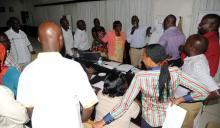WHO-Uganda Staff Complete Global Learning Programme Training on National Health Policies, Strategies and Plans
Kampala, 2nd December 2013 -- Staff of the WHO Country Office in Kampala completed a three-day training Global Learning Programme (GLP) workshop on National Health Policies, Strategies and Plans.
The main objective of the training was to enhance WHO capacity (individual and institutional) to engage in effective policy dialogue with national stakeholders and global partners and to effectively provide technical support using comprehensive health systems approach around health policies, strategies and plans.
GLP is a corporate strategy intended to build WHO’s capacity in health policy dialogue through development of personal professional skills of its staff. It cuts across all levels and clusters of WHO and is funded from the Staff Development Fund.
GLP training uses existing tools, trainings and expert networks to provide continuous and sustained adult learning to staff to upgrade technical and soft skills required in the development of a sound Health Sector Strategic and Investment Plan (HSSIP).
With facilitation by international and local resource persons, the participants were guided through the GLP process to strengthen WHO’s leadership in health policy dialogue, brokering, negotiation and effective coordination of partners.
The WHO’s 1948 constitution , mandate, the six core functions, the 12th General Programme of Work, the Regional Office agenda and the Country Cooperation Strategy were the basis for prioritizing WHO’s work and interventions in Uganda.
Given the skills, staff are now expected to prioritize WHO’s support to Uganda focusing on issues that can be efficiently and fully implemented. They are also expected to reposition WHO in relation to partners and be able to evaluate, ascertain and advise government on relevant interventions.
During the training, staff developed a roadmap aimed at understanding and supporting country level health policy processes outlining key events that will take place in the next 6 to 24 months.
Communication and advocacy were given more attention given the organization-wide reforms that emphasizes strategic communication by all staff as one of the ways to reposition WHO to lead international technical public health.
Speaking at the end of the training, the WHO Country Representative Dr Wondimagegnehu Alemu noted that GLP training is one of the most important activities undertaken by the organization in last two years in which all staff should participate. He added that “GLP is not a health systems project. It is for the entire organization using a systems approach to advise member states”.
Dr Alemu praised the technical and soft skills training of the GLP adding that the training was an opportunity to interact as a team and advance the common agenda and objectives of the organizations. Dr Alemu also noted the training as timely, coming at a time when the office completes the workplan for the next biennium 2014-2015 and as the Ministry of Health develops the next Health Sector Strategic and Investment Plan 2015/16 – 2019/20.
“WHO Staff at country level are “the face of the organization” therefore the way they behave, speak and interact with the outside world impacts on the image of the organization” he said. He therefore emphasized the importance of the staff to constantly update their knowledge to avoid misrepresenting or under-representing the organization.
The training was much appreciated by all participants. The team strongly proposed to organize similar training for the MoH Top Management so that we all have the same understanding of the National Health Policy, Strategy and Plan process.
Overall, the staff resolved to mutually support each other and build a formidable country office team to adequately support and advise the Ministry of Health deliver good health services to all Ugandans.
_________________________________________________________________
For more information please contact :
Benjamin Sensasi, Health Promotion Advisor, WHO Country Office
Tel 256-414-335500 Email: sensasib [at] ug.afro.who.int




